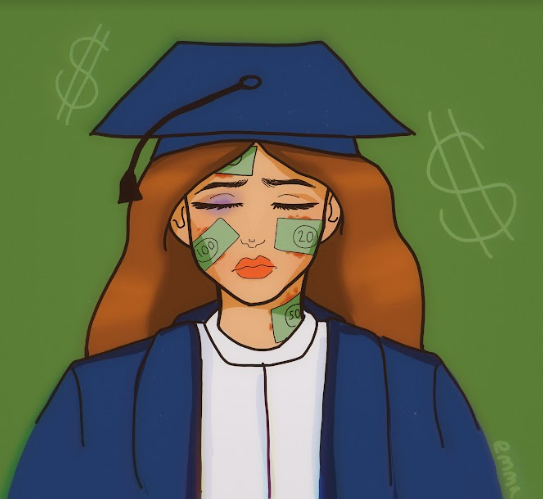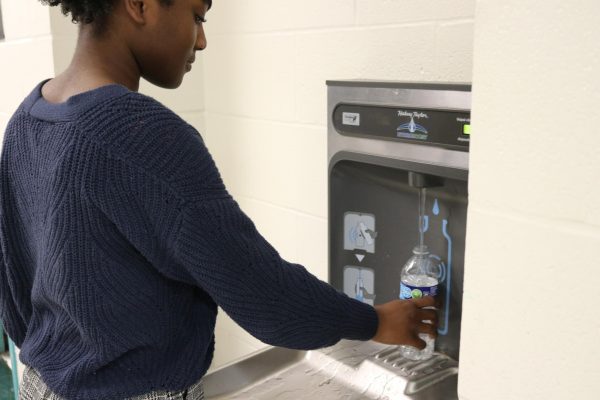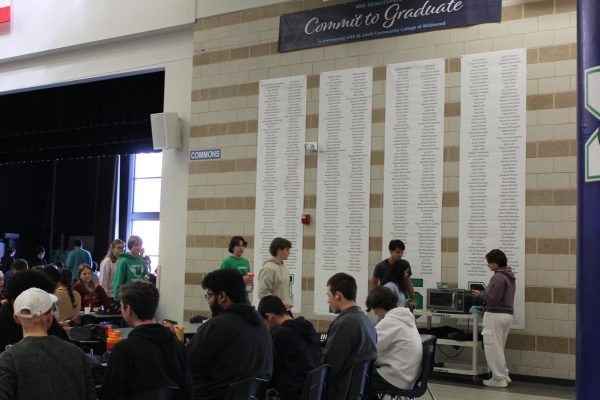Student Debt Relief Plan Affects Marquette Grads, Staff

Media by Emma Tyulyayev
The Student Loan Plan announced by the Biden Administration gives $20K in Pell Grants and $10K in debt cancellation to individual income under $125K and household income less than $250K.
After 14 years of Leslie Tiemeyer paying off loans, finally, all of them were gone.
“I called my husband, and I said, ‘I think my loans are gone.’ and he said ‘Oh My God that’s amazing!’, and then I cried, because it was a very large sum of money,” Tiemeyer said. “I feel like I won the lottery by having my loans forgiven.”
Tiemeyer and tens of millions of people with student debt have been aided by the Student Debt Relief Plan that was announced earlier this fall by the Biden Administration. The plan is set to relieve student debt up to $20K in Pell Grants and $10K in debt cancellation if individual income is less than $125K and household income is less than $250K.
Tiemeyer said that even though the $10K thousand dollars and loan forgiveness is good, the plan is not without its faults.
Tiemeyer said the plan is great in that it allows forgiveness of some loans, but until interest rates are fixed, the plan is not a permanent solution to the student debt problem. The ideal solution would be to fix interest rates.
“The reason why student loans are so difficult to pay off is because of the interest rates,” Tiemeyer said. “With it being compounded daily, it becomes nearly impossible for people to pay off their loans.”
“When I took out my loans, I paid on them for 14 years, and I ended up owing more money on my loans than when I originally took them out,” Tiemeyer said. “If I remember correctly it was about $8 thousand more.”
Carlos Restrepo, Class of 2008, graduated from St. Louis University with a masters in International Business and a bachelors from Webster University in Communication and Journalism. He has mixed feelings about the Student Debt Relief Plan.
“It didn’t feel like it addressed the problem; it just felt like it put a band-aid on it,” Restrepo said.
Restrepo originated from Colombia, where healthcare and education is guaranteed and tuition at good quality universities is almost nothing, Restrepo said.
Colombia has its fair share of problems, and coming to the U.S just seemed like the best choice for Restrepo and his family, Restrepo said. “That being said, I do not think that there is nothing to be learned from countries that provide free or more affordable education.”
Restrepo and his family had only moved to the U.S. in 2005, just two years before he began school.
His parents were at that time just learning English, and the application process and loan payment plan was highly confusing to him and his family.
“If I had gotten just a little bit more help figuring it out at that age, I would have maybe made some different decisions here and there,” Restrepo said. “I just wish things were simplified for students.”
When Restrepo graduated college, his job at a newspaper in Marshall Missouri was not enough to support him and his student debt, causing him to get a second job waiting tables to keep up, Restrepo said.
Restrepo said he considered changing career paths because of the debt, as it didn’t seem worth it to pursue a career path that would require him to have to work a second job in order to meet his basic needs.
“Try your best not to take out loans, and do everything in your power to get the education you want without getting in debt for it,” Restrepo said.
College prices have experienced rapid inflation of about 7% a year as States provide less and less funding, Katie Bauman, government teacher, said.
Initial college payment is becoming more expensive, and as that happens, loans become bigger and bigger, Bauman said.
The plan was made in order to help people with student debt recover from the financial damage that COVID caused, and gives $20 thousand to students who received federal aid from the government, Bauman said.
Bauman said that the Student Debt Relief Plan does very little to address the price of college, and even though it does forgive debt, it doesn’t do much to help students in the future.
“What about the next generation, what about you guys?” Bauman said.
Republicans are concerned that the plan goes beyond Biden’s alloted power and is too expensive, Bauman said.
The plan will cost the government and taxpayers approximately 24 billion dollars per year, where COVID financial relief checks amounted to a total of 803 billion dollars.
“When we talk about it being expensive, it’s way less money than what was given out during COVID as relief checks,” Bauman said. “By relieving student debt, you’re allowing greater money circulation in the economy.”
In opposition, Democrats argue that the plan did not go far enough, Bauman said.
“Many Democrats have said that yes it doesn’t do everything that we wanted, but it’s also a step in the right direction,” Bauman said.
Your donation will support the student journalists of Marquette High School. Your contribution will allow us to purchase equipment and cover our annual website hosting costs. You may become a PATRON by making a donation at one of these levels: White/$30, Green/$50, Blue/$100. Patron names will be published in the print newsmagazine, on the website and once per quarter on our social media accounts.

Willem Hummel, Senior is a News Editor for the Marquette Messenger. This is his third year on staff, he has been involved in the Track Team, and Cross...

Emma Tyulyayev is an Illustrator for the Marquette Messenger. This is her second year on staff. After school, she enjoys driving around and going on frequent...






